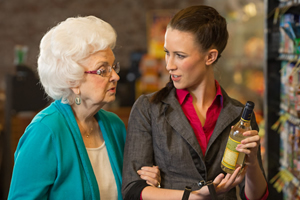Alzheimer’s Care
Trained caregivers care for our clients with cognitive impairments.
According to the Alzheimer’s Association (2023), there are more than 6.7 million seniors in the United States who suffer from Alzheimer’s dementia and that number is projected to rise to nearly 13 million by 2050. Alzheimer’s disease is the most common form of dementia, although other forms of dementia include Vascular dementia, Lewy Body Disease, Frontotemporal dementia, Alcohol related dementia, Down syndrome and Alzheimer’s disease, HIV associated dementia, and Chronic Traumatic Encephalopathy (CTE) dementia.
Alzheimer’s dementia is a brain disease that causes a slow decline in memory, thinking and reasoning skills.
Alzheimer’s care, as well as other forms of dementia care, require compassionate, well-trained individuals who come to your loved one’s home to provide care and support.
Elderly clients with Alzheimer’s dementia often have difficulty communicating, experience changes in mood and behavior, and struggle to complete daily tasks including – showering, dressing and toileting. Additionally, sleeping patterns may be disrupted due to changes in medication and other factors. Seniors may begin to wander, get lost and experience increased confusion.

Family members who are the primary caregivers for their loved ones often struggle to balance their caregiving responsibilities with work and family obligations. Additionally, it can be emotionally challenging to care for someone with dementia; the added stress can bring up feelings of guilt and sadness.
When providing professional in-home care to clients struggling with Alzheimer’s – or other forms of dementia – it is important to create a safe and comfortable environment that encourages routine and consistency.
Our Home Health Aides (HHAs) complete comprehensive dementia training to understand the disease process and learn strategies for managing difficult behaviors. These HHAs receive special training for dealing with memory loss, behavior modification, personal care and other important care needs unique to Alzheimer’s disease.
- Memory Care: Caregivers can help clients experiencing memory loss by helping them remember essential details like medication schedules, appointments, and daily routines. Caregivers can also use memory games and exercises to help slow the progression of memory loss.
- Personal Care: Caregivers can assist with Activities of Daily Living (ADLs) including – showering, toileting, grooming, and dressing. Caregivers can also monitor changes in health status including – hygiene habits and changes in physical condition (such as bed sores, etc).
- Medication Reminders: Clients with dementia, including Alzheimer’s dementia, often require multiple medications – all of which must be taken at the right time and at the correct dosage. Professional caregivers can help with these medication reminders.
- Mobility Assistance: Dementia clients, including those with Alzheimer’s dementia, often struggle with balance and mobility. These issues may result in increased falls. Caregivers can help reduce mobility challenges – helping clients with safe transfers or using assistive aides like gait belts, walkers, or wheelchairs.
- Meal Preparation: Professional caregivers can prepare nutritious meals for clients, taking into account any dietary restrictions or preferences. Since clients with Alzheimer’s may forget to eat, this additional assistance can help ensure they receive appropriate nutrition and hydration.
- Emotional Support: Alzheimer’s and dementia can be isolating. Caregivers can be a great source of companionship – engaging in meaningful activities and offering emotional support to help reduce feelings of loneliness and isolation.
- Behavior Management: Clients with dementia, including Alzheimer’s dementia, clients may display challenging behaviors such as wandering, agitation, or aggression. These behaviors can sometimes increase towards of the end of the day. Caregivers are trained to manage and respond to these behaviors calmly and compassionately, using techniques including – redirection and reassurance.
- Communication Techniques: Trained caregivers use effective communication techniques to improve interactions between the caregiver and the individual with Alzheimer’s dementia. These techniques may include speaking slowly, using visual aids, and validating feelings and concerns.
Our comprehensive Alzheimer’s dementia care program includes:
- Encouraging independence, while providing assistance with Activities of Daily Living (ADLs) including – personal care (showering, dressing, toileting, etc), as well as assistance with Instrumental Activities of Daily Living (IADLS) including – light housekeeping, laundry – including changing bed linens, meal preparation, medication reminders, shopping, transportation to appointments, and more.
- Completing a comprehensive Client Assessment.
- Developing and implementing a client-centered Care Plan.
- Providing comprehensive caregiver training and continuous hands-on supervision.
- Providing continuous communication with family and care providers.